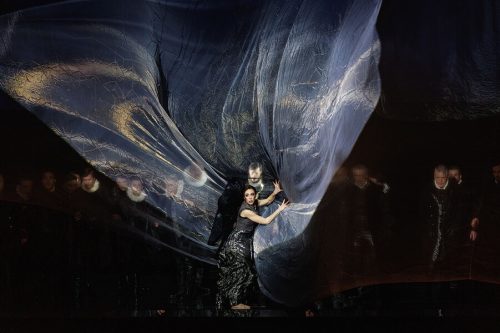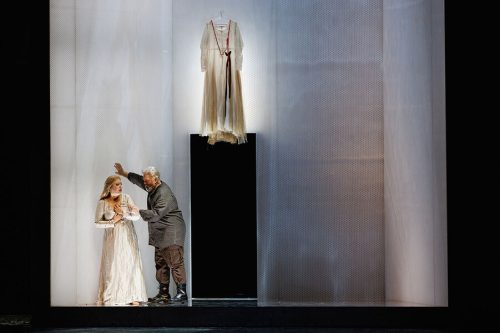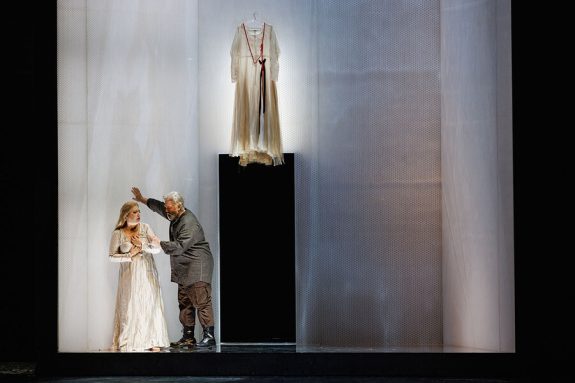 Germany Verdi, Otello: Soloists, Semperoper Childrens Choir, Sächsische Staatsopernchor, Sächsische Staatskapelle Dresden / John Fiore (conductor). Semperoper Dresden, 17.5.2024. (MC)
Germany Verdi, Otello: Soloists, Semperoper Childrens Choir, Sächsische Staatsopernchor, Sächsische Staatskapelle Dresden / John Fiore (conductor). Semperoper Dresden, 17.5.2024. (MC)

In the lead up to the 400th anniversary of Shakespeare’s death that fell in 2016 a new opera production was commissioned by the Salzburg Easter Festival. It was a co-production between Salzburg and the Staatsoper Dresden. Artistic director of the Salzburg Festival was Christian Thielemann, then also principal conductor of the Staatskapelle Dresden, the festival’s resident orchestra. Verdi’s Otello was chosen, and a blue-chip production team formed comprising renowned French stage director Vincent Boussard, sets by designer Vincent Lemaire and costumes by Christian Lacroix the celebrated French fashion designer.
A great admirer of Shakespeare, Verdi had written the operas based on Macbeth, Otello and Falstaff. Widely regarded as twin summits of the Italian opera tradition Otello and Falstaff, his final two operas, almost hadn’t come to fruition. After the success of Aida in 1871 Verdi had essentially retired from writing new stage works. Publisher Giulio Ricordi together with brilliant librettist Arrigo Boito were enthusiastic to provide Verdi with an Italian libretto based on the Shakespeare tragedy Othello, the Moor of Venice. Eventually Verdi was persuaded to write the music to Boito’s libretto. Finally, after a 16-year span since his last premiere with Aida, the tragedy Otello was introduced in 1887 at La Scala, Milan. It was a runaway success.
With his adaptation of Shakespeare’s Othello Boito keeps to the Bard’s original plot. There is love and passion, sexual jealousy, suspicion and betrayal, and racial prejudice including the mixed-race marriage. With its elevated level of music and drama in Otello Verdi and Boito demonstrate their genius, as Otello is drawn into a calamitous maelstrom.
The first time Vincent Boussard’s Otello was staged at Semperoper Dresden was in February 2017 and there is a video of those performances available on DVD/Blu-ray. Here revival director Heiko Hentschel and set designer Rena Donsbach seem to have maintained much of Boussard’s original vision.
Boussard and his team created an unsettling and chilly atmosphere. Ceaselessly gloomy and bleak the staging has been described as funereal, as if pre-empting the fateful events. Lemaire’s shadowy sets featuring grey and black combined well with Guido Levi’s lighting design and Isabel Robson’s video projections. In the same manner of the sets, Christian Lacroix’s costumes, were a mix of styles, unrelated to any era, certainly not Cyprus at the end of the fifteenth century as Boito had conceived.
Two particular features of the staging stood out. A section of stage curtain repeatedly billowed out quite effectively representing raging storms at sea. There was the inclusion of a non-singing character the winged Angel of Death, wearing black, danced by Sofia Pintzou. Largely slinking across the stage, the Angel followed the events and occasionally interacted with the principal characters on stage. At one point the wings of the Angel suddenly caught fire.

Our tragic hero Otello, a Moor, general of the Venetian forces has become governor of Cyprus. Verdi and Boito have created a shattering portrayal of Otello who is misled into groundless jealously and distrust, with a searing inner anguish, eventually killing his wife Desdemona the woman he loves. As Otello, American tenor Gregory Kunde a seasoned soloist knows the opera well having made his professional debut in Otello as Cassio at Chicago some 46 years ago. In 2012 Kunde sung his first Otello and was soon winning plaudits for his performances. Lacroix dressed Kunde in modern day combat gear a grey shirt, dark grey trousers with leg pouches and black tactical boots. Such a demanding role Kunde is a confident performer on stage. Though now 70 the tenor had clearly maintained his powerful voice and displayed no shortage of stamina. Projecting well through the theatre Kunde’s voice sounded better the more force he produced. Not too many years ago I saw productions where characters had blacked-up for roles, but Kunde didn’t, although Otello was a Moor. However, I was rather surprised that Otello was described on the surtitles as a ‘thick lipped savage’.
The epitome of pernicious evil, Iago is seething with anger having been publicly stripped of his rank of ensign by Otello in favour of Cassio. Unable to control himself Iago embarks on a treacherous scheme of deception to inflict deadly revenge on Otello and Cassio. No stranger to the role, Russian baritone Aleksei Isaev sang Iago in 2018 at the Staatstheater, Wiesbaden with Kunde in the title role. Mightily convincing in the role, showing plenty of stagecraft Iago did come across as a menacing character, who hates Otello, hellbent on seeking revenge. Isaev’s baritone was dark and expressive and the second act aria Credo in un Dio crudel was a highlight as Iago vented off his nihilistic views. Lacroix had dressed Iago in a blue suit featuring an embossed frockcooat, yet it was shame the gloomy lighting obscured most of the detail.
Loyal wife and supporter of Otello, Desdemona is subjected to baseless rumour of being unfaithful with Cassio. Our Desdemona was Armenian soprano Hrachuhí Bassénz who in 2022 sang the role at both Covent Garden and Bucharest. Although a rather static figure on stage it didn’t seem to matter as Bassénz’s singing was quite magnificent especially her famous Willow Song as she communicated her emotions about a woman who remains devoted to her lover despite his brutal behaviour.
Newly promoted by Otello as his lieutenant young Cassio now outranks Iago who despises him. I couldn’t connect with American tenor Joseph Dennis as Cassio whose stage presence made little impression together with singing that lacked strength and I strained to hear him.
A New Yorker, John Fiore conducted the Staatskapelle Dresden who responded with playing that was beyond reproach. Directed by André Kellinghaus the Staatsopernchor made an exceptional sound and are always a joy to hear. Comprising of 21 boys and girls dressed as altar servers wearing red cassocks and white surplices the children’s choir sounded first rate reflecting the successful coaching of Claudia Sebastian-Bertsch.
At Dresden this revival of Vincent Boussard’s production of Verdi’s masterpiece Otello was given a performance of high quality.
Michael Cookson
Production:
Direction – Vincent Boussard
Revival director – Heiko Hentschel
Set design – Vincent Lemaire
Revival Set design – Rena Donsbach
Costume design – Christian Lacroix
Lighting design – Guido Levi
Video – Isabel Robson
Choreography – Helge Letonja
Chorus director – André Kellinghaus
Cast:
Otello – Gregory Kunde
Jago – Aleksei Isaev
Desdemona – Hrachuhí Bassénz
Cassio – Joseph Dennis
Rodrigo – Timothy Oliver
Lodovico – Tilmann Rönnebeck
Montano – Martin-Jan Nijhof
Emilia – Nicole Chirka
Araldo – Anton Beliaev
Dancer, Angel of Death – Sofia Pintzou
